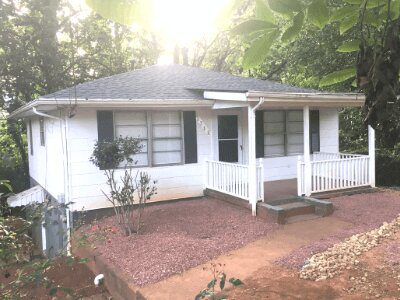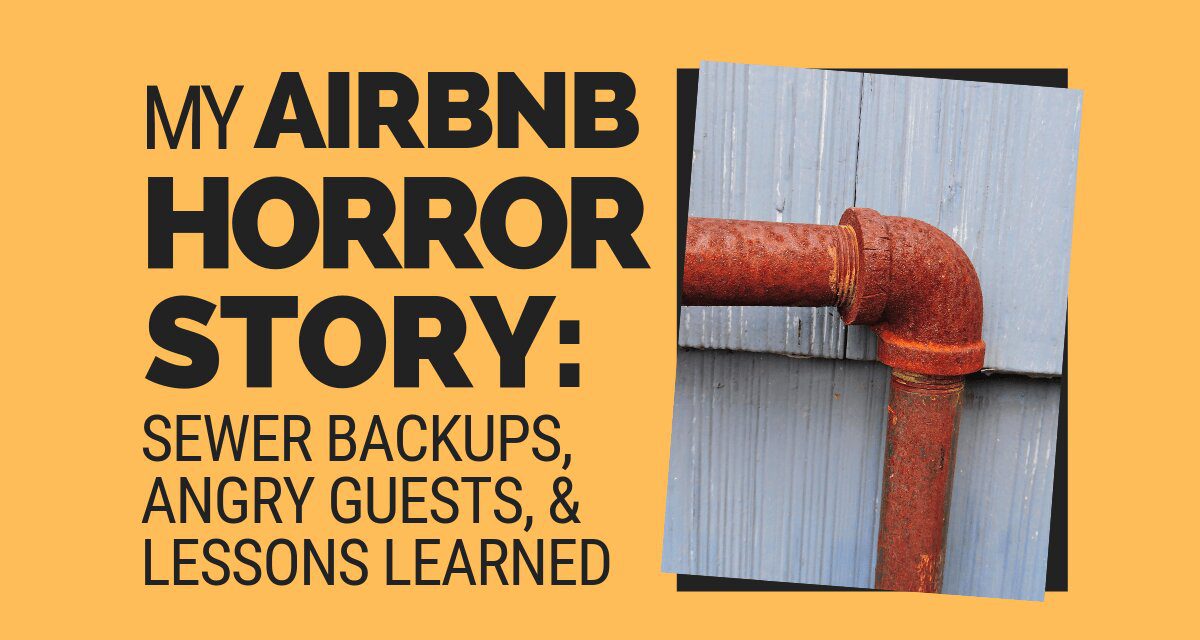When I bought my first AirBnB rental property about a year ago, I had dollar signs in the eyes. (You can read all of my initial ideas on “How to Invest in AirBnB Property” here.) I had all my numbers carefully crunched in my custom-designed Airbnb calculator, and was ready to sign the contract and start cashing checks.
If only life worked like a calculator.
Instead, I learned more about building repairs, plumbing, working with contractors, and sewer systems than I ever wanted to know.
My Airbnb Investment
But first, I should back up and tell you what I’ve been up to. In a nutshell, I purchased a 1930s-era bungalow on the south-side of Atlanta (near the Hartsfield-Jackson airport) to rent on the AirBnB platform. The idea was to offer more space than a hotel (two bedrooms, a full kitchen with laundry, living/dining room area, and one full bath) for about the same price. So for approximately $80-100/night, you could get all that instead of being cramped in a small hotel room.
Happily, the little house I stumbled upon was perfect for this scenario. It had already been converted into two apartments and was even being rented via the AirBnB platform already. I could see the listings and get an idea of how well they rented. Then, using a research platform called AirDNA, I was able to calculate the rental rates for the area and get a good understanding of demand.
In calculating my net return-on-investment (ROI), I anticipated 10-20% type returns on my investment. Everything looked good and ready to go.
My AirBnB Horror Story
But if you’ve ever been involved in any way with rental real estate, you probably have an idea where this story is heading. What I didn’t know at the time was that part of the sewer system for the downstairs apartment included 80-year-old clay pipes that were completely clogged full of roots.
So, one day in the first few weeks of renting, a guest reported “water” flowing into the apartment from the downstairs toilet. This happened in the middle of the night causing him to awake at 2am to a funky smell and a wet floor. Thankfully, he was the only one staying there that night, but I still felt terrible about his experience. To make matters worse, he left to find a hotel, demanded a refund (which I was more than happy to give), and gave a negative review before we even had much of a chance to try and make it right.
(For the record, the property had been fully inspected by one of Atlanta’s top home inspectors (he had the highest certifications and even taught classes on home inspection at the local college), and I had still no idea about the sewer problems. It wasn’t until I paid thousands of dollars to have practically half of the backyard dug up did I learn about the piping issues. And no, for reasons I’m still not sure I completely understand, running a camera down the line couldn’t fully diagnose the issues either.)
If you’ve ever hosted on AirBnB, you know how important good reviews are to having your listing being seen by potential guests. One negative review can pull down weeks of positive reviews, so it’s paramount to provide a consistently positive experience for guests. During this period, I made the mistake of continuing to rent the downstairs, thinking that the sewer issues had been solved. Plumber after plumber told me it was this problem or that, leading me to even consider spending $25k+ on a lift station that ultimately wasn’t needed. In this period, I received several bad reviews for this plumbing issue that seemed to come and go without warning.
Finally, I decided enough is enough, and gave the “go ahead” to dig up the backyard. It was abundantly clear that that was the only definitive way to know what was really going on. This led to a permanent fix, but not before my AirBnB listing’s rating was ruined beyond repair by a few negative reviews. Yes, we probably could have eventually brought it back to life with positive reviews, but it would have taken so long to reach a high 4-star level (4.7+) that we deemed it ultimately wasn’t worth it. Instead, we had to create a new listing and start from scratch.
Lessons Learned
Like I said before, if you have experience with rental real estate, none of this will sound too surprising. There’s an old saying that encapsulates the experience of most rental real estate investors–you have to learn to deal with “tenants, toilets, and trash.”
Initially, my grand idea was that by using AirBnB I could avoid most of the problems with tenants. That’s because, obviously, guests that only stay for a week or so are less likely to completely trash your place. In addition, having the place routinely inspected between guest stays hopefully means you catch issues before they become serious problems.
And, trash also becomes less of an issue since professional cleaners are giving the place a deep clean between each stay. If you do have someone who damages your property, you’re covered by the mandatory deposit that AirBnB collects on your behalf.
But toilets, and all the other things that can potentially break on your property? Well, you’re still on the hook for those. That’s why I recommend building a cushion into your budget for routine maintenance and caretaking. And even beyond routine maintenance, we have to acknowledge that any man-made system will eventually break, and usually at the worst possible time. Luckily, I had set aside some cash for that eventuality; if not, honestly I would have been in a LOT of trouble.
Does Passive Real Estate Investing Exist?
If I’ve completely discouraged you from investing in real estate, don’t despair. It is possible to invest in real estate in a passive way, just like you can invest in companies through stocks. However, I should caveat that by saying that I believe that you will slightly reduce your potential long-term returns by doing so. I mean, it only makes sense, right? Nothing in life comes for free. If you offload all the management responsibilities to someone else, they will obviously take a piece of the profits.
Still, if truly passive real estate is your goal, you do have a few additional options. Along with the traditional real estate investment trust (REIT), a number of new options have also sprung up in recent years. Below are a few options that I’m familiar with, although I should make it clear that this is not an endorsement or recommendation for any of these platforms. (Please read my disclaimer–although I’m a registered investment advisor representative, nothing on this blog is meant to be read as investment advice!)
As of this writing, I don’t have any money invested in real estate outside of my AirBnB property, but that doesn’t mean you won’t find an option that works for you. As always, please do thorough research before putting any money at risk in any investment.
- REITs — Real estate investment trusts (REITs) are investments that you can buy and sell like a stock. Think of them like a mutual fund, but instead of buying and selling stocks and bonds on your behalf, the manager of the REIT buys, sells, holds and sometimes even manages real estate properties within the trust. It’s probably the easiest way to get exposure to real estate–all it takes is one-click in your favorite online brokerage account.
- Private REITs — While most REITs are traded on the stock exchange and therefore experience the volatility that comes with the stock market, it is possible to invest in private REITs instead. Private REITs are valued based on the underlying property values themselves, but often do not offer the same level of liquidity as a public REIT. For example, Fundrise is an online investment platform for private REITs with investment minimums as low as $500.
- High Net Worth Investors only — RealtyMogul is an online platform that allows accredited investors to partner with institutional real estate managers to make direct commercial real estate investments. You must have annual income above $200k or net worth (outside your home) of at least $1 million to qualify as an accredited investor.
Share Your AirBnB Horror Story
Do you have an AirBnB hosting horror story? What do you think of mine? What advice do you have for me or other potential AirBnB investors? Leave your thoughts in the comments below!



